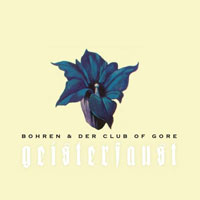Zwanzig Jahre nach "Gore Motel" und immerhin f■nf Jahre nach "Dolores" ver—ffentlicht das eigensinnige Quartett Bohren & Der Club of Gore ein Album mit dem recht schl■pfrigen Titel "Piano Nights", dessen Sound nur noch von ferne an die ideale Schnittmenge aus "Midnight Radio" und "Sunset Mission" denken lðsst und stattdessen den Albumtitel musterg■ltig und voller Respekt vor dem Song einl—st. Im unverkennbaren Bohren-Style!
Nach dem 3-Track-Zwischenwerk "Beileid" (2011) war vieles denkbar, schlieÔlich hatte die Band hier erstmals mit einem Gastsðnger namens Mike Patton experimentiert und zudem auch noch unironisch Warlocks "Catch My Heart" gecovert. Verglichen damit, stellt "Piano Nights" tatsðchlich so etwas wie eine R■ckkehr zu den eigenen Wurzeln dar, allerdings auf der Grundlage komplexerer Arrangements und einer erweiterten Sound-Palette.
Die vier Musiker, die "Piano Nights" ■brigens selbst f■r ihr bestes Album seit "Black Earth" halten, legen wert darauf, dass es sich bei dem Albumtitel nicht um eine Persiflage handelt, sondern um einen an sich selbst gestellten Anspruch. Zudem gelte es bei jedem neuen Album, dass ■ber die Jahrzehnte erarbeitete Level an Verbindlichkeit zu halten und nicht in Routine zu verfallen. "Horror Jazz" is endg■ltig over, Baby!
Wieder also gelingt Bohren & Der Club Of Gore ein provokanter musikalischer Gegenentwurf zum rastlosen Zeitgeist, ein kosmischer Doom-Bar-Jazz-Ambient-Komacore."
(musikexpress, Februar 2014)
Attraktiver kann ein Soundtrack zur H—llenfahrt nicht sein!
(Jazzthing, Februar / Mðrz 2014)
Though there was an EP in between, it has been over five years since Bohren & Der Club of Gore's last full-length, Dolores. That record provided a shift in their trademark, "doom-ridden jazz music." There, one could actually hear lighter, breezier sounds in their suffocating, black narcotic mix. The nine tunes on Piano Nights walk a line between the haunted beauty of Dolores and the more austere, glacial darkness of earlier recordings. Co-composers Christoph Cl—ser (piano, saxophones, vibes) and Morten Gass (organ, Mellotron, baritone guitar, piano) create an uneasy tension that compares to something that approaches the airy compositions of Angelo Badalmenti -- with their beautiful veneer of innocence that barely conceals the sinister -- and the, mysterious, near-Gothic explorations of Harold Budd (Á la The White Arcades and The Serpent (In Quicksilver). The rhythm section of bassist Robin Rodenberg and drummer Thorsten Benning remain almost tensely restrained, but given the pace of these tracks, sticking to that economic language is remarkable. While the set is constructed to be listened to as a whole, there are standouts. Opener "Im Rauch" has a lonesome saxophone solo and vibes adding color and texture to the spectral, minor-key moodiness. "Fahr Zur H—lle" is almost church-like in its processional pace, led by organ, piano, and Mellotron. Though it doesn't swing (nothing this band plays ever does), the vibes on "Ganz Leise Kommt Die Nacht" recall the approach of the Modern Jazz Quartet's Milt Jackson on the Atlantic-era MJQ album, with sparse, spacious lyrical assertions amid otherwise gray, gauzy textures. Two-thirds of the way through, a sampled, wordless vocal chorus changes the cut's entire flavor, and it becomes a funereal dirge. "Verloren (Alles)" is the most skeletal track here in terms of form; the doubled saxophones move along a nearly static scalar line as piano and rhythm section sketch in brief melodic ideas over ten-and-a-half minutes. Closer "Komm Zur■ck Zu Mir" brings the sampled chorale back amid pronounced tensions via the use of electric guitar and an icy tenor saxophone -- think Jan Garbarek at his most speculative and pensive. It sends Piano Nights off in an inviting if cautious wash of darkness, both earthy and otherworldly.
(by Thom Jurek, All Music Guide)

 Plattentipp
Plattentipp 


